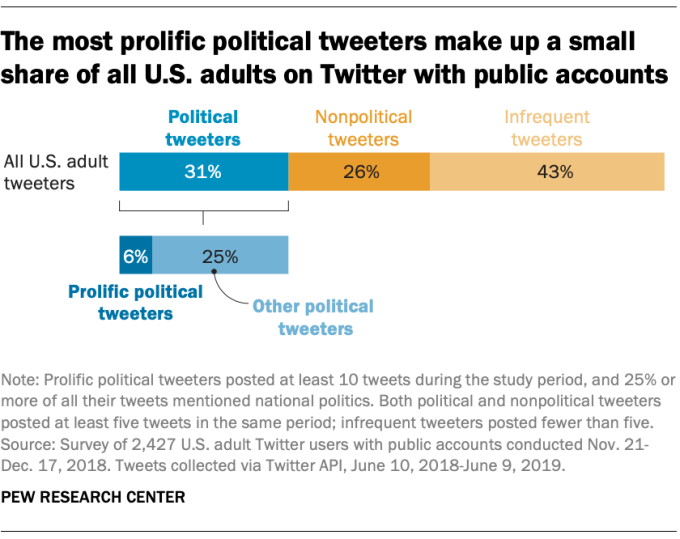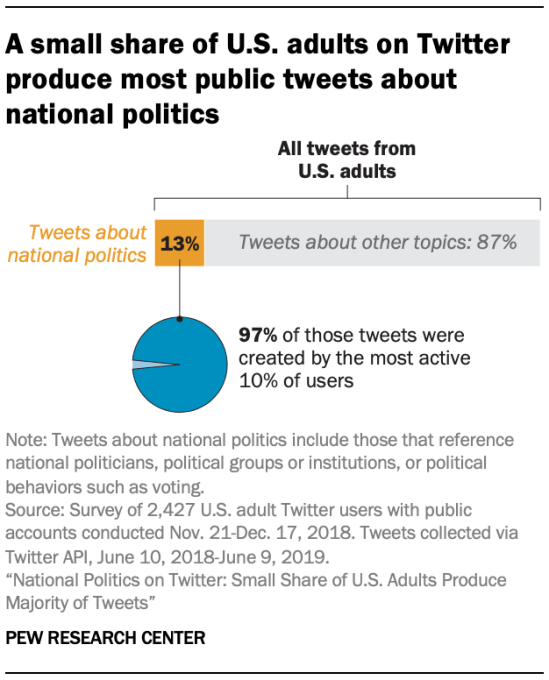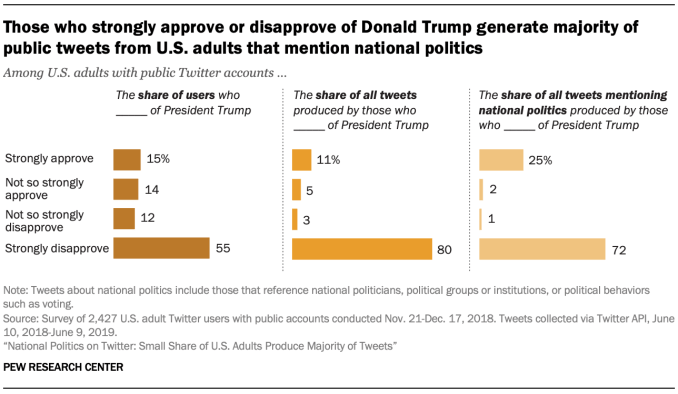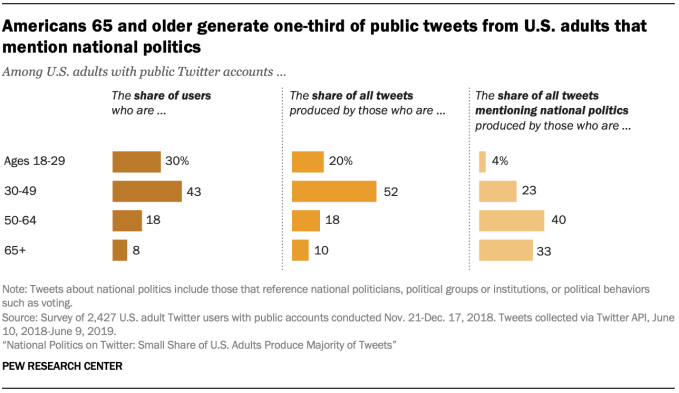Social Media
Just 6% of U.S. adults on Twitter account for 73% of political tweets…and they disapprove of Trump

A small number of prolific U.S. Twitter users create the majority of tweets, and that extends to Twitter discussions around politics, according to a new report from the Pew Research Center out today. Building on an earlier study which discovered that 10% of users created 80% of tweets from U.S. adults, the organization today says that just 6% of U.S. adults on Twitter account for 73% of tweets about national politics.
Though your experience on Twitter may differ, based on who you follow, the majority of Twitter users don’t mention politics in their tweets.

In fact, Pew found that 69% never tweeted about politics or tweeted about the topic just once. Meanwhile, across all tweets from U.S. adults, only 13% of tweets were focused on national politics.
The study was based on 1.1 million public tweets from June 2018 to June 2019, Pew says. 2,427 users participated.

Similar to its earlier report about how prolific users dominate the overall conversation, Pew found there’s also a small group of very active Twitter users dominating the conversation about national politics — and they all tend to be heavy news consumers and more polarized in their viewpoints.
Only 22% of U.S. adults even have a Twitter account, and of those, only 31% are defined as “political tweeters” — that is, they’ve posted at least 5 tweets and have posted at least twice about politics during the study period.
Within this broader group of political tweeters, just 6% are defined as “prolific” — meaning they’ve posted at least 10 tweets and at least 25% of their tweets mention national politics.
This small subset then goes on to create 73% of all tweets from U.S. adults on the subject of national politics.
What’s concerning about the data is that it’s those who are either far to the left or far to the right who are the ones dominating the political conversation on Twitter’s platform. A majority of the prolific political tweeters (55%) say they identify as either “very liberal” or “very conservative.” Among the non-political tweeting crowd, only 28% chose a more polarized label for themselves.
This polarized subgroup also heavily leans left. For example, those who strongly approve of President Trump generated 25% of all tweets mentioning national politics. But those who strongly disapprove of Trump generated 72% of all tweets mentioning national politics. (They’re also responsible for 80% of all tweets from U.S. adults on the platform.)

This isn’t a fully representative picture of U.S. politics. The share of U.S. adults on Twitter who strongly disapprove of Trump (55%) is 7 percentage points higher than the share of the general public that holds this view (48%).
Trump supporters, as a result, are under-represented on Twitter. Perhaps this is because they’ve flocked to alternate platforms; or because don’t tweet their views as often in public; or because they violate Twitter’s policies more often, resulting in bans. Or as is likely, it’s a combination of factors. In any event, the reasoning was beyond the scope of this study.
The study also found the prolific tweeters are highly engaged with the news cycle. 92% follow the news “most of the time,” compared to 58% of non-prolific political tweeters and 53% of non-political tweeters. They’re also civically engaged, as 34% have attended a political rally or event, 57% have contacted an elected official, and 38% have donated to campaigns.
Also of note, the political tweets are more likely to come from older users. Those ages 65 and older produce only 10% of all tweets from U.S. adults, but they contribute 33% of tweets related to national politics. And those 50 and older produce 29% of all tweets but contribute 73% of tweets mentioning national politics.

These political tweeters also create so-called “filter bubbles” where they mostly follow people who think the same as they do. 45% of Democrats said they did this, compared with 25% of Republicans. Across all U.S. adults, 31% of Democrats said they did this, versus 15% of Republicans.
But there is one thing a majority of U.S. Twitter users can agree on: most (57%) believe any news they see on social media is “largely inaccurate.”
The full report is available here.
-

 Entertainment7 days ago
Entertainment7 days agoEarth’s mini moon could be a chunk of the big moon, scientists say
-

 Entertainment7 days ago
Entertainment7 days agoThe space station is leaking. Why it hasn’t imperiled the mission.
-

 Entertainment6 days ago
Entertainment6 days ago‘Dune: Prophecy’ review: The Bene Gesserit shine in this sci-fi showstopper
-

 Entertainment5 days ago
Entertainment5 days agoBlack Friday 2024: The greatest early deals in Australia – live now
-

 Entertainment4 days ago
Entertainment4 days agoHow to watch ‘Smile 2’ at home: When is it streaming?
-

 Entertainment3 days ago
Entertainment3 days ago‘Wicked’ review: Ariana Grande and Cynthia Erivo aspire to movie musical magic
-

 Entertainment2 days ago
Entertainment2 days agoA24 is selling chocolate now. But what would their films actually taste like?
-

 Entertainment3 days ago
Entertainment3 days agoNew teen video-viewing guidelines: What you should know
















